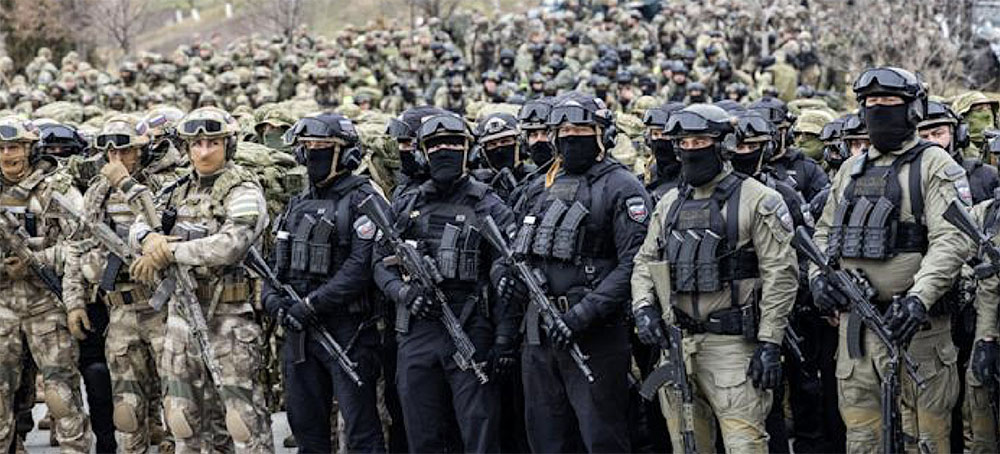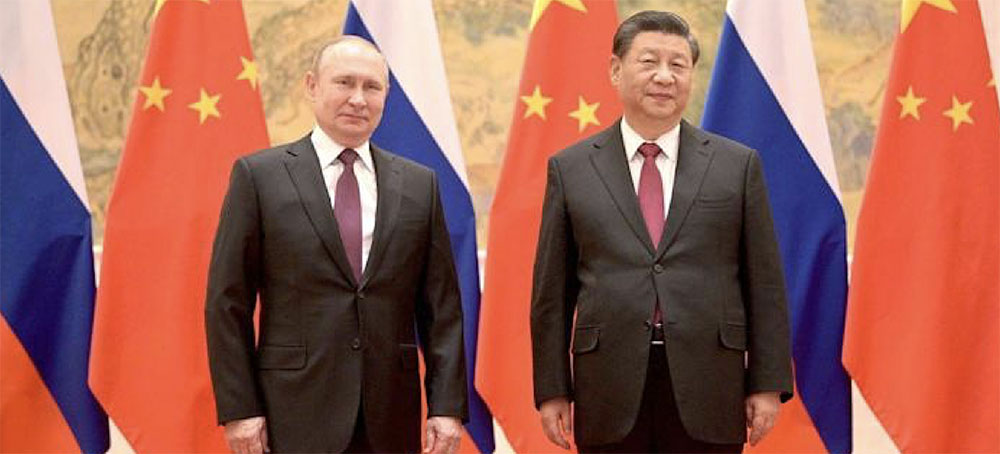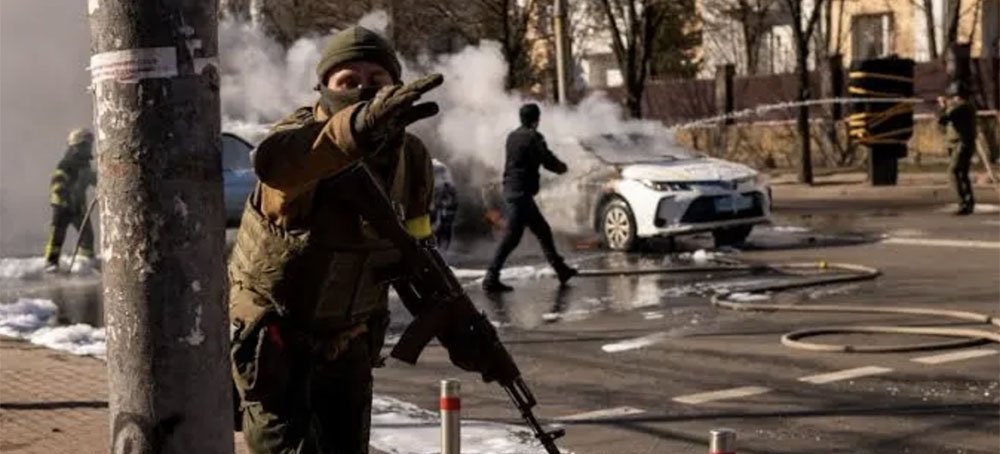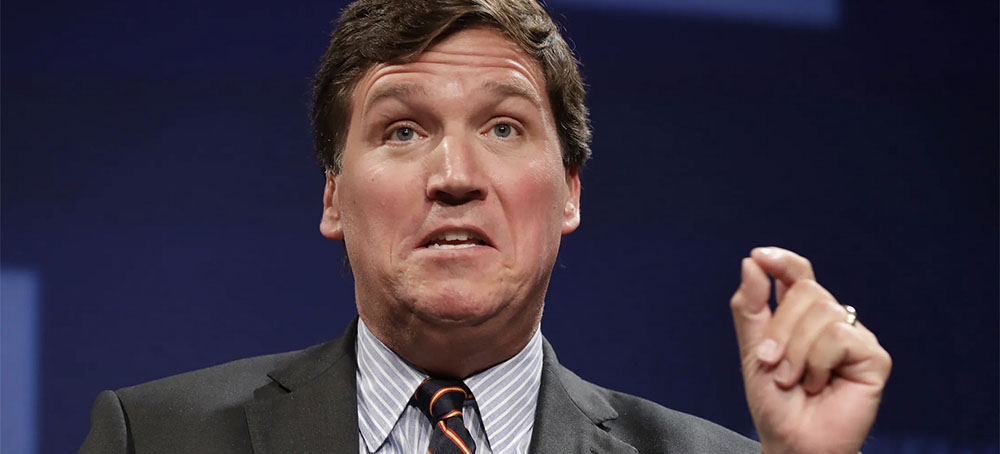Can Someone, Anyone Donate $100?
We’re under 48 hours to go for February and way below where we were last month and where we need to be. This is a serious problem that threatens RSN — for real.
Who out there can spare a hundred?
With urgency and respect.
Marc Ash
Founder, Reader Supported News
If you would prefer to send a check:
Reader Supported News
PO Box 2043 / Citrus Heights, CA 95611
Follow us on facebook and twitter!
Live on the homepage now!
Reader Supported News
The Fox News host suddenly decided to backpedal on Thursday night, after he was extensively quoted on Russia’s state-run TV.
Yes, if you missed Carlson‘s most recent shows, a quick recap of commentary he’s offered on the situation:
- It’s “not un-American” to support Putin;
- Democrats will find you guilty of treason if you don’t hate Putin;
- The whole thing is simply a “border dispute”;
- “Ukraine is not a democracy”;
- Ukraine is a “puppet” of the West; and
- Our personal favorite, that unless Vladimir Putin has personally had you or one of your family members murdered, you really don’t have any right to criticize the guy:
Just how pro-Putin were Carlson’s comments? Clearly they speak for themselves, but if you need more convincing, just know that they were good enough for Russia’s state-run TV. Per The Intercept:
At least four times this week, Russian news reports have featured translated clips of Tucker Carlson or his guest Tulsi Gabbard, a former Democratic U.S. representative…. At 8 p.m. on Sunday, a primetime review of the week’s news presented by Dmitry Kiselev, a bombastic Putin favorite, featured remarks from the opening monologue of Carlson’s February 17 show, in which the American commentator trashed Ukraine’s government.
An hour later, the evening news program on Russia’s main state television channel used a longer excerpt from the same Carlson monologue and shaped its own report to amplify the Fox News host’s attack on a Democrat. In the original Fox News broadcast, Carlson had suggested that Sen. Richard Blumenthal, a member of the Senate Armed Services Committee who worked to arm Ukraine with Javelin anti-tank missiles, was only doing so because of donations from American defense contractors like Raytheon.
On Wednesday night, just hours before Putin ordered the attack on Ukraine to begin, two excerpts from Carlson’s most recent program were featured in Russian state television’s 8 p.m. and 9 p.m. news broadcasts…. Carlson’s comments were so welcome in Moscow that an excerpt from that rant with Russian subtitles was quickly produced by the Russian-language service of RT, the government-funded network formerly known as Russia Today.
Was being used as a literal tool of Russian propaganda the straw that broke the camel’s back for Carlson? It’s impossible to say why he suddenly decided to backtrack, but presumably it (1) can’t be trusted and (2) he’ll be back to praising ole Vlad very soon.
Undoubtedly true given that the guy who was president a few years ago reportedly wanted to…pull out of NATO and empower Russia
And now, some trenchant analysis from Rep. Gazpacho Police
Lindsey Graham can’t believe Joe Biden would nominate a Supreme Court justice who he [checks notes] personally voted to confirm to the federal bench eight months ago
Mike Pence not sure why the left isn’t full of praise for an arch conservative who wants to overturn Roe v. Wade, has come out against press freedoms, and hates affirmative action …among other things
Truly, it’s a real mystery. Perhaps Mother can help him crack it.
Report: Some of the documents Trump took to Mar-a-Lago were a big f---ing deal
Code-name, shall-not-be-spoken-of-in-public, Voldemort–level big deal. Per The Washington Post:
Some of the presidential records recovered from former president Donald Trump’s residence at Mar-a-Lago are so sensitive they may not be able to be described in forthcoming inventory reports in an unclassified way, two people familiar with the matter said Friday. The revelation comes as Rep. Carolyn B. Maloney (D-N.Y.) sent the National Archives and Records Administration a request for further information on 15 boxes of records recovered from Trump’s Mar-a-Lago resort last month. The Archives set Friday as its deadline for an inventory of the contents. The Archives has publicly confirmed earlier reporting by The Washington Post that classified materials were found within the boxes and that torn-up records had been transferred to the Archives but not reconstructed by the Trump White House.
The inventory is expected to provide more information on the volume and scope of classified documents, including details on the level of classification, according to the two people familiar with the matter, who spoke on the condition of anonymity to discuss a sensitive topic. There are records at the very highest levels of classification, including some that can be viewed by only a small number of government officials, the two people said.
In her letter, Maloney requested a “detailed description of the contents of the boxes recovered from Mar-a-Lago…and identification of any items that are classified and the level of classification” by March 10. “I am deeply concerned that former president Trump may have violated the law through his intentional efforts to remove and destroy records that belong to the American people,” Maloney wrote. “This Committee plans to get to the bottom of what happened and assess whether further action is needed to prevent the destruction of additional presidential records and recover those records that are still missing.”
While experts agree that Trump broke the law by taking the documents with him, like so many times in his life, it appears he could still evade any and all repercussions. Attorney General Merrick Garland confirmed earlier this month that the Justice Department was in touch with the National Archives, but notably did not not promise a full investigation.
 Russian servicemen take part in a review of the Chechen Republic's troops and military hardware at the residence of Ramzan Kadyrov, head of the Chechen Republic. (photo: Yelena Afonina/TASS/Getty Images)
Russian servicemen take part in a review of the Chechen Republic's troops and military hardware at the residence of Ramzan Kadyrov, head of the Chechen Republic. (photo: Yelena Afonina/TASS/Getty Images)
The documents, sent exclusively to ITV news and signed by Deputy Health Minister Plutnitsky, ask medical teams "to be promptly involved in activities aimed at saving lives & preserving the health of people in Russia."
Emma Burrows, ITV's news editor, wrote that it "indicates Russia is anticipating a massive medical emergency" and could be forced to deploy doctors and medics from health organizations across the country.
It requests that medical institutions send a list of medical specialists and their details to the Russian health ministry to deploy them when needed. Medics that it is looking for include trauma, heart, maxillofacial and pediatric surgeons, anesthetists, radiologists, nurses (including for operating rooms), and infectious disease specialists.
The document states that these people will be paid by the "Federal Center of Medical Disasters."
A Ukrainian military official told ITV news that this document shows that the Russians "did not expect to face such a level of resistance and losses" and that they are "far from achieving their goals" of a quick, surprise attack.
They also added that this leaked document could show that Putin intends to "go until the end, despite huge losses of personnel."
An intelligence update by the UK Ministry of Defence on February 26 stated that "Russian casualties are likely to be heavy and greater than anticipated or acknowledged by the Kremlin."
According to the official Ukrainian Parliamentary Telegram channel, the Ukrainian military has killed over 3,000 Russian troops and captured 200. Mykhailo Podoliak, an advisor to Ukrainian President Volodymyr Zelenskyy, is quoted in Ukrainian media saying, "this shows that Ukraine has not just survived, Ukraine is winning!"
 Vladimir Putin and Xi Jinping. (photo: Yahoo News)
Vladimir Putin and Xi Jinping. (photo: Yahoo News)
Why it matters: Reiterating that Russia's "legitimate security demands" on NATO expansion "should be taken seriously and properly addressed," the statement marks China's most extensive one yet on Russia's unprovoked invasion of Ukraine.
The big picture: Weeks before the attack began, Chinese President Xi Jinping and Russian President Vladimir Putin issued an unprecedented joint statement seeming to align their visions for an anti-Western international order.
- The two authoritarian powers have fostered deeper ties, including in military cooperation, as tensions with the U.S. have soared over the past several years — raising major alarms in Washington.
- Russia and China said they "oppose further enlargement of NATO" and called on the West "to abandon its ideologized cold war approaches."
Driving the news: Following a call with his British, EU and French counterparts, China's Foreign Minister Wang Yi outlined Beijing's position on Ukraine in five points:
- China "firmly advocates" abiding by the UN Charter and respecting the territorial integrity of all countries, including Ukraine.
- The security of one country cannot be strengthened at the expense of another, and Russia is justified to have concerns about five rounds of NATO expansion.
- China believes "all parties" should exercise restraint and protect civilian life and property to prevent a large-scale humanitarian crisis.
- China supports "direct dialogue and negotiation between Russia and Ukraine as soon as possible" and believes Ukraine "should be a bridge between East and West, not a frontier of great power confrontation."
- The UN Security Council should be used to "facilitate a diplomatic solution" and "cool tensions rather than fuel them." China has always opposed UN resolutions that invoke Chapter VII of the UN Charter, which authorizes military and non-military steps to "restore international peace and security."
Between the lines: The New York Times reported Friday that U.S. officials tried half a dozen times over three months to get China to help head off a Russian invasion of Ukraine, but that Beijing did not believe the warnings and even shared the information with Moscow.
What to watch: With major Western sanctions set to isolate Russia from much of the global economy, many experts believe the Kremlin's dependence on China will dramatically increase.
 Ukraine. (photo: Pragativadi)
Ukraine. (photo: Pragativadi)
The Kyiv Independent now reports the hotline has received "hundreds of calls" already.
The service is called "Come back alive from Ukraine” and was launched on Saturday by Ukraine's Defence Ministry.
"On this phone line, you can find out whether your relatives are still alive, taken prisoner, injured, and you can decide when and how to take the body of your deceased relative," an official said.
The hotline is a direct appeal to Russians, thousands of whom have been protesting against President Putin's war in Ukraine despite being faced with arrest.
Russians and Ukrainians have described each other as "like brothers and sisters" at anti-war protests around the world in recent days.
 Starbucks employees in Mesa, AZ celebrate on Feb. 25, 2022 after learning election results were in favor of having their store unionize. (photo: Terry Tang/AP)
Starbucks employees in Mesa, AZ celebrate on Feb. 25, 2022 after learning election results were in favor of having their store unionize. (photo: Terry Tang/AP)
The Starbucks in the city of Mesa is now the first to unionize outside of Buffalo, New York, where organizing efforts first took off.
Several workers from a Mesa Starbucks store cheered and hugged at a local union hall after the results came in. Workers were overwhelmingly in favor of unionizing, voting 25-3. Forty-three ballots in total were initially mailed out, organizers said.
“The way that we smoked them with how many we got — yeses — that really shows that this is really a movement for people and we just want what is kind of an inalienable right for people,” said Liz Alanna, a shift supervisor at the store. “It feels good what we were fighting for, everybody wanted.”
Starbucks “will respect the process and will bargain in good faith,” spokesman Reggie Borges said in an email.
“We hope that the union does the same,” he added.
Pro-union leaders say Starbucks workers deserve the right to collectively bargain on issues like benefits, seniority pay and pandemic safety protocols.
Tyler Ralston, another shift supervisor, said he is excited that workers now may be able to make meaningful changes.
“We would like to be able to not feel understaffed. We would like to have better working conditions, having things fixed on time. A pension of course would be a great thing,” Ralston said.
Originally scheduled for last week, the election was postponed after Starbucks filed a request for a review with the Washington, D.C.-based National Labor Relations Board.
The Seattle-based coffee giant argued that a single store should not be allowed to hold a vote. Instead, a vote should include all the locations in that store’s assigned district.
The labor board denied the request, saying it did not see any issues.
The organizers in Mesa called the request a “union busting” tactic by the company, Alanna said. She also alleged Starbucks implemented other strategies like having upper-level managers shadow workers to make sure they weren’t organizing.
Borges, the Starbucks spokesman, called accusations of union-busting “categorically false.”
The Starbucks in Mesa is now the first to unionize outside of Buffalo, New York, where organizing efforts first took off.
Over 65 stores in 20 states have filed petitions with the labor board to hold union elections since two in Buffalo unionized in the last few months, according to labor union Workers United.
Starbucks officials have spoken against unionizing, asserting the company functions best when it can work directly with its employees. Some workers have disputed that claim.
Efforts to form unions have led to tense conflict. Earlier this month, seven Starbucks workers were fired after spearheading a union campaign in Memphis, Tennessee. The company said they violated policy by reopening a store after closing time, inviting non-employees inside and doing TV interviews from there.
Employees countered that Starbucks was retaliating and said they planned to file a complaint with the National Labor Relations Board.
After decades of decline, unions have become a popular strategy. Multiple polls show union approval is high — and growing — among younger workers. U.S. union membership levels are ticking upward for workers between 25 and 34, even as they decline among other age groups, according to the federal Bureau of Labor Statistics.
 Leonard Cohen's masterpiece rendition of the War II resistance anthem The Lament of the Partisan. (photo: Image outtake The Partisan live in France, 1970/YouTube.)
Leonard Cohen's masterpiece rendition of the War II resistance anthem The Lament of the Partisan. (photo: Image outtake The Partisan live in France, 1970/YouTube.)
"The Partisan" is an anti-fascist anthem about the French Resistance in World War II. The song was composed in 1943 by Russian-born Anna Marly (1917–2006), with lyrics by French Resistance leader Emmanuel d'Astier de la Vigerie (1900–1969), and originally titled "La Complainte du partisan" (English: "The lament of the partisan"). Marly performed it and other songs on the BBC's French service, through which she and her songs were an inspiration to the Resistance. A number of French artists have recorded and released versions of the song since, but it is better recognised globally in its significantly, both musically and in the meaning of its lyrics, different English adaptation by Hy Zaret (1907–2007), best known as the lyricist of "Unchained Melody".
Canadian singer-songwriter Leonard Cohen (1934–2016) recorded his version, using Zaret's adaptation, and released it on his 1969 album Songs from a Room, and as a 7-inch single in Europe. Cohen's version re-popularised the song and is responsible for the common misconception that the song was written by Cohen. It has inspired many other artists to perform, record and release versions of the song, including American Joan Baez (born 1941), on her 1972 album Come from the Shadows, and with the title "Song of the French Partisan", Canadian Buffy Sainte-Marie (born c. 1941) and Israeli Esther Ofarim (born 1941)."
Lyrics Leonard Cohen, The Partisan.
When they poured across the border
I was cautioned to surrender,
this I could not do;
I took my gun and vanished.
I have changed my name so often,
I've lost my wife and children
but I have many friends,
and some of them are with me.
An old woman gave us shelter,
kept us hidden in the garret,
then the soldiers came;
she died without a whisper.
There were three of us this morning
I'm the only one this evening
but I must go on;
the frontiers are my prison.
Oh, the wind, the wind is blowing,
through the graves the wind is blowing,
freedom soon will come;
then we'll come from the shadows.
Les Allemands étaient chez moi (The Germans were at my home)
ils m'ont dit "Résigne-toi" (They said, "Surrender,")
mais je n'ai pas pu (this I could not do)
j'ai repris mon arme (I took my weapon again)
J'ai changé cent fois de nom (I have changed names a hundred times)
j'ai perdu femme et enfants (I have lost wife and children)
mais j'ai tant d'amis (But I have so many friends)
j'ai la France entière (I have all of France)
Un vieil homme dans un grenier (An old man, in an attic)
pour la nuit nous a cachés (Hid us for the night)
les Allemands l'ont pris (The Germans captured him)
il est mort sans surprise (He died without surprise)
Oh, the wind, the wind is blowing,
through the graves the wind is blowing,
freedom soon will come;
then we'll come from the shadows.
 The court's conservatives may use West Virginia v EPA as a preemptive strike against environmental regulation, some legal scholars say. (photo: J David Ake/AP)
The court's conservatives may use West Virginia v EPA as a preemptive strike against environmental regulation, some legal scholars say. (photo: J David Ake/AP)
Rightwing groups are urging the supreme court to hobble not just environmental regulation, but Biden’s ability to govern
The consequences could be even more substantial, however, reaching deep into the Biden administration’s authority to govern.
The court will be considering the 2015 Clean Power Plan, a signature Obama program requiring states to lower greenhouse gas emissions from power plants. It was touted as critical to the achievement of the landmark Paris climate agreement, but its existence was short-lived: a coalition of states and energy groups sued to stop it, the supreme court blocked it and Donald Trump, self-professed lover of coal, repealed it when he took office.
The Biden administration said it would not reinstate the Clean Power Plan, even after a federal court invalidated Trump’s repeal, because the goals of the plan had already been met through market forces, and because it was considering a new rule to replace it. So it came as a surprise when the supreme court announced it would review the lower court’s decision.
Why is the court hearing a challenge to a plan that has never really been in effect, and never will be?
Richard Lazarus, a professor of environmental law at Harvard University, thinks the court may be interested in a preemptive strike against ambitious environmental regulation. “This is a shot across the bow,” he says. “We’re going to tell you what you can’t do in case you’re even thinking about it.”
But some court observers believe the case, West Virginia v EPA, may be an opportunity for the court’s conservative supermajority to take an even bigger hammer to the government’s regulatory power, helping to see through a Trump administration objective: the “deconstruction of the administrative state”.
A muscular decision could help upend the power of the government to regulate a range of issues, from air quality to workplace protections to drug safety, and mean an effective supreme court veto over Joe Biden’s agenda.
There are a number of ways the justices could rule in the EPA case.
They could restrict the EPA’s powers under the Clean Air Act, the legal foundation for the Obama plan. They could more broadly target its power to address environmental concerns. They could also dismiss the case outright since the Clean Power Plan doesn’t actually exist.
Or they could rule in a manner with implications beyond the EPA, as a who’s who of rightwing groups, many linked by funding from billionaire Charles Koch, have urged them to do in briefs filed in the case.
By some counts, at least five justices have expressed interest in reviving a legal doctrine dormant since the 1930s, until recently considered fringe, which views much of the authority of the executive branch as illegitimate. Under an expansive version of that view, “most of government is unconstitutional”, Justice Elena Kagan has warned.
The case “could be extraordinarily important, it could be moderately important, or it could be a case the court just dismisses on a belated realization that there’s no live controversy at all,” says Kate Shaw, professor at the Cardozo School of Law and co-host of the Strict Scrutiny podcast, which covers the supreme court.
“The fact that the court took the case at all is concerning to me and suggests the court may want to use this case as a vehicle to really change the law,” she says.
Some believe the case could undo the US government as we know it.
In the 1930s, Franklin Delano Roosevelt’s New Deal created dozens of government programs and agencies to improve the US economy and create a social safety net. But the supreme court, in those years famously pro-business and prone to strike down social welfare legislation, thwarted him at every turn. In two decisions, it invoked a principle of “nondelegation” – a doctrine that says the constitution forbids Congress from transferring power to federal agencies to make rules.
In 1937, faced with FDR’s threats to expand the court in order to push his legislation through, the court did an about-face and began upholding New Deal laws. The nondelegation doctrine faded into obscurity and the administrative state flourished.
Ever since, the delegation of authority from Congress to agencies has been core to the functioning of government.
Congress passes broad legislation enshrining certain principles and instructs agencies to fill in and update the details. The Clean Air Act, for example, instructs the EPA to regulate harmful emissions, but leaves it up to the agency to determine how to do so. The Occupational Safety and Health Act gives the Occupational Safety and Health Administration (OSHA) the authority – recently restricted by the court – to issue standards regulating workplace safety.
Particularly central in an age of congressional gridlock, this model of government allows experts in federal agencies to issue rules without Congress needing to regularly pass detailed laws.
“Whether we’re talking about energy regulation, environmental regulation, workplace health and safety regulation, labor regulation – in each of those areas, Congress has passed broad statutes and given agencies a lot of discretion to implement those statutory directives,” says Shaw. “Depending on what the court says if it does reach the merits in this case, that could throw into question the permissibility of all of those delegations, which are in many ways the foundation of modern governance.”
In the last two decades, and with particular fervor since the Obama presidency, the nondelegation doctrine has gained traction among originalists – jurists who claim to adhere to a meaning of the constitution fixed at the time of its drafting – who insist America’s founders were opposed to Congress delegating regulatory power to agencies. (Scholars respond that the doctrine has no basis in history or in the constitution).
“Congress cannot duck its responsibility for making hard choices requiring compromise … by passing the buck to unelected, politically unaccountable administrative agents. The Constitution flatly prohibits Congress from delegating any of its legislative power to other entities,” according to a brief filed by the Koch-backed political advocacy group Americans for Prosperity.
“As Justice Thomas has observed: ‘The end result may be trains that run on time (although I doubt it), but the cost is to our Constitution and the individual liberty it protects,’” the brief continues. Americans for Prosperity campaigned aggressively for the confirmation of Trump’s three supreme court nominees.
Conservatives on the supreme court have expressed varying degrees of sympathy for this view, most recently when they blocked the Biden administration’s vaccine-or-testing mandate for large employers.
In that case, three justices – Neil Gorsuch, Thomas and Samuel Alito – signed a concurring opinion, invoking both the nondelegation doctrine and the major questions doctrine, a related theory that says matters of major economic or political importance must be mandated by Congress. In a different case, Chief Justice John Roberts joined a dissent asserting the doctrine. Add to that signals from Brett Kavanaugh, and there are five justices who have voiced at least some support for using this arcane theory to undo the post-New Deal arrangement undergirding American government.
Lazarus, the environmental law professor, has some sympathy for a principled view that major agency action should have backing from Congress.
“The problem is, what do you do with that if you know Congress isn’t going to pass anything? We have a climate problem that if we don’t address [it] in the near term, it’s just an irreversible disaster at some point,” he says. “One is hard pressed to contend that the constitution requires such a catastrophic result.”
Follow us on facebook and twitter!
PO Box 2043 / Citrus Heights, CA 95611




No comments:
Post a Comment
Note: Only a member of this blog may post a comment.